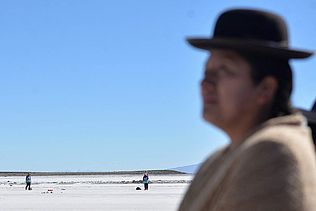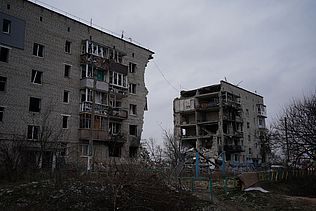An automatically scrolling list of names and dates of birth cast against a black background is going viral on social media these days: the names of children who have died in the Israeli attacks in Gaza are scrolled across the screen in an endless loop. You are asked to look at least long enough to find a child who has reached the age of two. In fact, names of children that did not even reach the age of one flicker before your eyes for too long. One is struck by the feelings of revulsion that this means of distilling attention can arouse. Almost half of the dead in Gaza are children.
The number of dead soldiers in the war in Ukraine, now entering its third year, is not counted, or rather: it is unpublished. They are said to number in the hundreds of thousands. They are dying even more anonymously than the children in Gaza, whose names can at least be found on the Internet. Ukrainian society still believes in a victory over Russia and does not want to know the numbers of its dead. But more and more men are hiding from conscription. Meanwhile, a new law on conscription is intended to ensure "transparent" mobilisation, as the army is running out of soldiers. Conscription notices are now being sent to cell phones. There is not to be any escape from national service any longer.
War and consumer peace
Shortly after the start of the war in Ukraine, the Spanish philosopher Raúl Sánchez Cedillo published a book on the background and consequences of the war with the support of medicos: "This war will not end in Ukraine": He was not only spot on with the title. He also argued that Western societies were falling prey to a war regime that would leave its mark on economy, politics and culture. Two years ago, this could still have been dismissed as an overly gloomy forecast. Today, published opinion is characterised by a compulsion to show colours and good-vs.-evil world views. The war regime is also reorganising economic priorities. Instead of climate protection, rearmament is now the order of the day. The military-industrial complex is celebrating a rapid resurrection. The Putin regime shows that a war economy can work well for a time: while Russian soldiers from backwater provinces are being expended just like their Ukrainian counterparts, people in Moscow lead normal consumer lives. Starbucks is now called Tasty and Ikea Good Luck. Unlimited access to goods is what counts for the majority. The parallelism of war and consumer peace is a hallmark of our time.
This allows us to close our eyes to the fact that today's wars do not herald their possible end, i.e. are somehow an immoral means of achieving distant political goals, but rather the return of violent forms of conflict resolution that were no longer thought possible: in Ukraine, senseless mass dying for barely measurable territorial gains, as was once witnessed in the battles of the First World War; in the Gaza Strip, a war being waged by Israel with artificial intelligence, described by an Israeli intelligence officer in the newspaper Haaretz as a "mass murder factory". Many will argue that there are reasons for these wars: the Russian invasion, the Hamas massacre. That is true. But if this contextualisation is desired, then the question of causes and interrelationships must also be explored. Instead of endeavouring to understand it all, however, we retreat to an ontology of radical evil. The apparent inevitability of war, labelling any reflection a betrayal, simultaneously reproduces a Western sense of superiority in the face of its own loss of hegemony. Peace will not come from the West. War accompanies its waning star.
Germany, a provincial absurdity
Germany offers a special kind of provincial absurdity in all this. The plunge into a new era of warfare is difficult to reconcile with the German self-image of itself as a nation that has become a force of good once again. In a fog of morality, Israeli and Ukrainian flags fly in front of our town halls, positing that we are the good guys. Politicians parade through schools to instill conformity in the name of education. A consensus dictated from the top that the slaughter of almost 30,000 Palestinians is a "war of defence", a language reminiscent of the Russian phrase "special operation", is being imposed, even at the risk of making Germany seem even more provincial. Just recall the recent withdrawal by US artist Laurie Anderson, who did not want to subject herself a German examination of conscience. Forgotten are Alexander and Margarete Mitscherlich, who warned in 1967 in "Unfähigkeit zu Trauern" (Inability to Mourn) that the philo-Semitism of German elites is merely a veiled form of anti-Semitism. Today, the anti-Semites are the others: critical Jews, Palestinians by virtue of their existence, all the migrants who silently express their solidarity with the people in Gaza, partly because they feel they are being targeted themselves. Thomas Mann has also been forgotten. In 1945, he noted in his speech "Germany and the Germans", which we should read again today, that "wicked Germany is merely good Germany gone astray". For this reason, one could not completely deny the "guilt-ridden Germany and declare: 'I am the good, the noble, the righteous Germany in a white dress, the evil I leave to you for extermination'." Thomas Mann gave the speech when he became a US citizen. He only returned to Germany as a visitor. With the decoupling of Auschwitz from German history, transformed into a twelve-year case of sin and aberration, this "evil dress" has now been finally and permanently discarded.
Instead, the anti-Semitic sin is now instead referred to as post-colonialism. Its delegitimisation not only seeks to defend Israel in its contradictory existence, in which the desire for liberation and the desire for a safe haven are diametrically opposed by the colonial origin and the coloniser's resulting perpetual fear of the colonised. The West thus defends itself as well as its colonial transformation and exploitation of the world above all else. This is because the pledges and promises of a globalisation of growing prosperity for all have become hollow phrases. What remains is an immense hunger for resources to defend one's own prosperity against all the rest. Africa is being redivided in a scramble for hydrogen production and solar energy. The decolonial language of German foreign policy has difficulties masking this hunger. Since Gaza, it is no longer even a piecemeal approach. Hannah Arendt would not receive the Hannah Arendt Prize today, said the US publicist Masha Gessen recently. For Arendt, the connection between colonial crimes and Auschwitz was obvious. In "Elements and Origins of Totalitarianism", she draws a direct line from colonial crimes, their racism and their imperialist roots to Nazi colonialism and the extermination of the Jews.
Gaps and cracks in the system
Anyone looking for hope will hardly find it in the Global South, which has long since given up the desire for a new world order, as called for by the Non-Aligned Movement in Bandung in 1957/58, under the pressure of circumstances. And yet the gaps and cracks that are opening up in disputes characterising the multipolar world order are the places where something could emerge to constrain the omnipotence of the war regime. The UN, which in recent decades has largely abandoned Kofi Annan's social-democratic attempts at reform and has become more of a stabilising force for the status quo, is the last remaining civilian venue for world conflicts. Here, the accusations of anti-Semitism levelled by Israel and the West are more akin to verbal jokes than serious arguments. They only serve to further void the fight against anti-Semitism of its actual content.
The South African application filed with the International Court of Justice in the Hague, which was intended to prevent a possible genocide in Gaza, has put forward something that had yet to be heard. Namely, that the invocation of human and international law, as it was formed after the National Socialist crimes against humanity, is now only taken seriously by those who do not abuse it to legitimise their own power. The South African lawyers have not forwarded their pleas as state representatives, but based on their biographies in the confrontation with apartheid and the post-apartheid conflicts. The end of Western hegemony does not have to be followed by a war regime. It can also consist of a reflection on universal human rights, and here first and foremost on the right to rights that all inhabitants of this planet are entitled to. Gaza is a warning sign and raises the question of whether we the privileged are still capable of all-encompassing humanity. The South African lawyers have opened a new horizon with their insistence that the Palestinians are entitled to rights and that the war against them must end immediately. This is not only the only horizon remaining, but also the possibility of truth, the possibility of a new beginning.
Katja Maurer cannot be suspected of any enthusiasm for war. She knows what she is talking about: she has not only travelled to Israel, Gaza and the West Bank several times for medico, but also to Ukraine in 2022, a few months after the outbreak of the war.



